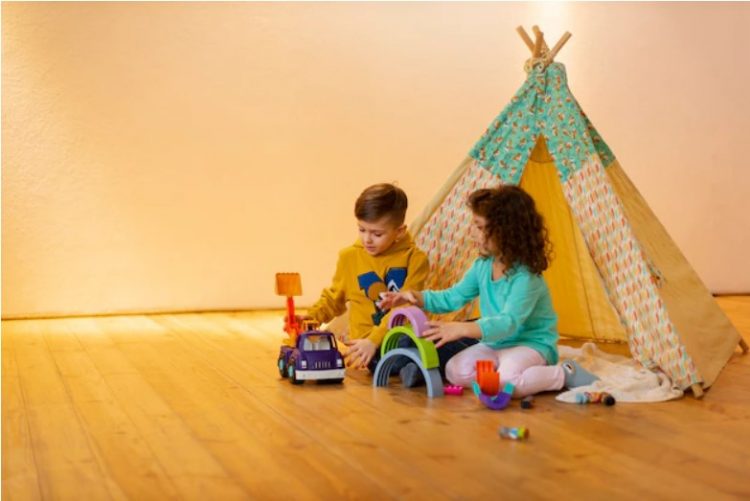Play is not just a form of entertainment, but a vital part of a child’s development. It is through play that children learn, explore, and discover the world around them. And when play is combined with educational toys, the benefits multiply. Educational toys are specifically designed to engage and stimulate children’s minds, fostering learning in a fun and interactive way. In this article, we will delve into the power of play and explore the numerous educational benefits that toys can offer to kids.
Engaging Minds: How Educational Toys Foster Learning in Children
Educational toys play a crucial role in promoting cognitive, language, and sensory development in children.
Cognitive Development
- Enhancing problem solving skills: From puzzles to building blocks, educational toys challenge children to think critically and solve problems. Through trial and error, they learn to strategize and find solutions.
- Developing logical thinking abilities: Toys that involve patterns, sequences, and categorization help children develop logical thinking skills. They learn to make connections, identify relationships, and apply logic in various scenarios.
Language and Communication Skills
- Promoting vocabulary expansion: Language focused educational toys such as word games and storytelling sets help children build their vocabulary and enhance language skills.
- Encouraging effective communication: Toys that encourage role playing and imaginative play provide children with opportunities to express themselves verbally, improving their communication skills.
Sensory and Motor Skills
- Improving hand eye coordination: Toys that require manipulation, such as building sets and puzzles, help children develop hand eye coordination and fine motor skills.
- Enhancing fine and gross motor skills: Toys that involve physical movements, like ride on toys or outdoor equipment, help children develop both fine and gross motor skills while having fun.
Unleashing the Potential: Exploring the Best Educational Toys for Kids
When it comes to educational toys, it is essential to consider age appropriateness and the specific areas of development they target.
Age Appropriate Toys
- Toys for infants and toddlers: Soft toys, activity mats, and teething rings are ideal for sensory development and early exploration.
- Toys for preschoolers and beyond: Building blocks, board games, and art supplies are perfect for fostering creativity, problem solving, and cognitive skills in older children.
STEM Toys
- Enhancing STEM skills: STEM toys, such as coding robots and science experiment kits, introduce children to science, technology, engineering, and mathematics concepts in a hands on and engaging way.
- Promoting critical thinking and problem solving: STEM toys challenge children to think critically, analyze problems, and come up with creative solutions, fostering their problem solving abilities.
Imaginative Play Toys
- Fostering creativity and imagination: Dollhouses, play kitchens, and dress up sets encourage children to think creatively and engage in imaginative play.
- Encouraging storytelling and role playing: Toys that allow children to create narratives and act out scenarios promote language skills, empathy, and social interaction.
From Fun to Learning: The Importance of Educational Toys in Child Development
Educational toys contribute to various aspects of a child’s development, including emotional growth and boosting confidence.
Emotional Development
- Building empathy and emotional intelligence: Toys that involve social interactions, such as board games and pretend play sets, help children understand emotions, learn empathy, and develop emotional intelligence.
- Encouraging social interaction and cooperation: Toys that require collaboration, such as building sets or team based games, foster social interaction, and teach children how to cooperate and work as a team.
Boosting Confidence and Self esteem
- Providing a sense of accomplishment: Educational toys that allow children to complete tasks or achieve goals provide them with a sense of achievement, boosting their confidence and self esteem.
- Encouraging independent thinking and decision making: Toys that necessitate decision making and independent thinking help children develop problem solving skills and build their confidence in making choices.
Unlocking Creativity: Using Educational Toys as Tools for Imaginative Play
Educational toys, such as building blocks and art materials, serve as tools to unlock a child’s creativity and foster imaginative play.
Building Blocks and Construction Sets
- Creating structures and spatial awareness: Building block sets enable children to construct intricate structures, improving their spatial awareness and understanding of shapes and sizes.
- Stimulating creativity and problem solving: Building and construction toys inspire children to think creatively, experiment with designs, and solve problems along the way.
Art and Craft Materials
- Encouraging self expression and fine motor skills: Art and craft toys, such as crayons, clay, and paint sets, provide children with a means to express their creativity and improve their fine motor skills.
- Developing aesthetic appreciation: By engaging in various art activities, children learn to appreciate colors, textures, and different art forms, nurturing their aesthetic senses.
Educational Toys: Creating a Fun and Stimulating Learning Environment for Kids
Creating a conducive learning environment and striking a balance between structure and open ended play are essential when using educational toys.
Creating a Learning Corner
- Designing a dedicated space for play and learning: Set up a specific area in your home where children can engage with their educational toys comfortably. This dedicated space helps create a learning friendly environment.
- Organizing toys for easy access and engagement: Store toys in an organized manner so that children can easily find and access them. This encourages self directed play and helps maintain an orderly space.
Balancing Structure and Open Ended Play
- Incorporating guided activities with educational toys: Schedule structured playtime where you can introduce specific educational toys and guide children through activities that promote learning.
- Allowing children to explore and experiment freely: Provide open ended educational toys that allow children to explore and play independently, stimulating their curiosity and encouraging self directed learning.
Playful Learning: How Educational Toys Can Support Children’s Academic Growth
Educational toys, specifically designed to promote academic skills, can significantly contribute to a child’s academic growth.
Alphabet and Numeracy Toys
- Developing early literacy and numeracy skills: Alphabet and number toys, like magnetic letters and counting sets, help children learn letters, numbers, and basic math concepts from a young age.
- Making learning enjoyable and memorable: By incorporating fun and interactive elements into educational toys, children find joy in learning, making the process more memorable and effective.
Puzzle and Strategy Games
- Enhancing problem solving and critical thinking abilities: Puzzles and strategy games, ranging from jigsaw puzzles to chess, challenge children’s cognitive abilities and encourage them to think strategically.
- Improving concentration and attention span: Toys that require focus and concentration, such as memory games or block puzzles, help improve children’s attention span and concentration skills.
Educational Toys for Kids: Nurturing Curiosity and Promoting Lifelong Learning
Certain types of educational toys, such as science kits and reading toys, nurture curiosity in children and foster a love for lifelong learning.
Science Kits
- Encouraging scientific exploration and experimentation: Science kits enable children to conduct hands on experiments, fostering curiosity about the world around them and encouraging a love for science.
- Cultivating a curiosity driven mindset: By providing tools for inquiry based learning, science kits inspire children to ask questions, seek answers, and develop a lifelong passion for learning.
Reading and Language Toys
- Instilling a love for reading and language acquisition: Toys that promote reading, such as storybooks and interactive reading devices, instill a love for books and language from an early age.
- Expanding vocabulary and comprehension skills: Reading and language toys expose children to new words, improve their vocabulary, and enhance their comprehension skills as they engage with different language activities.
Beyond Entertainment: The Educational Benefits of Toys for Kids
Educational toys can go beyond entertainment and have a significant impact on children’s understanding of the world around them.
Multicultural and Diversity Toys
- Promoting cultural awareness and understanding: Toys that showcase different cultures and ethnicities help children develop understanding, tolerance, and appreciation for diversity.
- Fostering tolerance and inclusivity: By playing with diverse toys, children learn to value differences, embrace inclusivity, and develop empathy towards others.
Environmental and Sustainability Toys
- Raising awareness about environmental issues: Toys that focus on environmental themes, such as recycling sets or nature exploration kits, raise children’s awareness of environmental conservation.
- Encouraging responsible and sustainable behaviors: Through play, children learn about sustainable practices, responsible consumption, and how their actions can contribute to a healthier planet.
Boosting Brainpower: Choosing the Right Educational Toys for Your Child
Choosing the appropriate educational toys for your child involves considering their interests, passions, as well as their specific developmental needs and objectives.
Considering the Child’s Interests and Passions
- Understanding individual preferences: Observe your child’s interests and preferences to understand what types of toys they are naturally drawn to. This ensures they engage with the toys and derive maximum educational benefits.
- Tailoring toy selection to match interests: Select educational toys that align with your child’s interests, hobbies, or favorite subjects to foster a deeper engagement and enthusiasm for learning.
Assessing Developmental Needs and Objectives
- Identifying specific areas for improvement: Determine the developmental areas your child needs to work on, such as fine motor skills, problem solving, or social skills. Consult with educators or developmental experts if needed.
- Choosing toys that address developmental goals: Select educational toys that target the specific developmental needs you have identified. Look for toys that encourage growth in those areas and provide opportunities for practice and improvement.
Conclusion:
In conclusion, the power of play combined with educational toys is undeniable. If you are interested in learning more about the best online toy store India, check out the website








